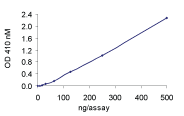
PTPN1 (PTP1B), Active(P28-20G)
FOR BULK ORDER REQUESTS PLEASE CONTACT US
Description :Recombinant full length human PTPN1 was expressed by baculovirus in Sf9 insect cells using a N-terminal GST tag.
Species :Human
Tag :GST tag
Expression System:Sf9 insect cells using baculovirus
Sequence :Full Length
Genbank Number :NM_002827
Specific Activity :Sample Enzyme Activity Plot. For specific information on a given lot, see related technical data sheet.
Purity :Sample Purity Data. For specific information on a given lot, see related technical data sheet.
Storage, Stability and Shipping :Store product at –70oC. For optimal storage, aliquot target into smaller quantities after centrifugation and store at recommended temperature. For most favorable performance, avoid repeated handling and multiple freeze/thaw cycles.
Applications :Phosphatase Assay, Western Blot
Molecular Weight :~71 kDa
Gene Aliases :PTP1B
Scientific Background :Protein tyrosine phosphatase nonreceptor, type 1 (PTPN1) is the founding member of the protein tyrosine phosphatase (PTP) family (1). PTPN1 catalyze the hydrolysis of the phosphate monoesters specifically from tyrosine residues. PTPN1 is known to be involved in signaling pathways that regulate a variety of cellular processes including cell growth and oncogenic transformation. PTPN1 also has been shown to act as a negative regulator of insulin signaling (2). PTPN1 has also been reported to dephosphorylate epidermal growth factor receptor kinase, which implicated the role of this phosphatase in cell growth control and cell response to interferon stimulation.
References :
1. Cheyssac, C. et al: Analysis of common PTPN1 gene variants in type 2 diabetes, obesity and associated phenotypes in the French population. BMC Med. Genet. 2006; 5 (7):44
2. Bento, J L. et al: Association of protein tyrosine phosphatase 1B gene polymorphisms with type 2 diabetes. Diabetes. 2004; 53(11):3007-12.
Product Sheets (By Lot #) :
Research Areas :Cancer, Inflammation, Metabolic Disorder, JAK/STAT Pathway, WNT Signaling, Invasion/Metastasis, Phosphatases, Cancer, Inflammation, Metabolic Disorder, JAK/STAT Pathway, WNT Signaling, Invasion/Metastasis, Phosphatases
